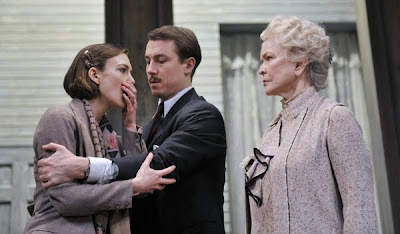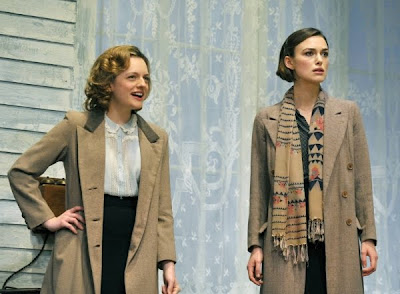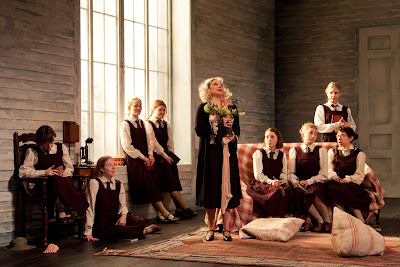 Being a film fan in the 1970s means there are a clutch of American actresses that I have an affection for and two such performers are Ellen Burstyn and Carol Kane. The news that they were to make their London stage debuts in the latest revival of Lilian Hellman's THE CHILDREN'S HOUR had me scurrying to book tickets.
Being a film fan in the 1970s means there are a clutch of American actresses that I have an affection for and two such performers are Ellen Burstyn and Carol Kane. The news that they were to make their London stage debuts in the latest revival of Lilian Hellman's THE CHILDREN'S HOUR had me scurrying to book tickets.The ticket prices however brought my scurrying to a skid with telephone number prices for 80% of the Comedy Theatre - presumably to match the costs of said actresses as well as the leads Keira Knightley and Elizabeth Moss. Ergo I could only afford tickets in the front row of the balcony - which wasn't too painful but for the safety bar that cut across one's view of the stage.
 I must admit I went along to gaze at my screen divas and didn't expect to be involved by the play as I was underwhelmed by it at the National Theatre in 1994. However Ian Rickson has directed the play with a relentlessness that powers you through Hellman's rather old-fashioned melodramatics and the committed cast give it their all. If I have a criticism of this approach it is that it refuses to allow any of the characters a moment of humanity so the grim note of the plot becomes rather unrelenting.
I must admit I went along to gaze at my screen divas and didn't expect to be involved by the play as I was underwhelmed by it at the National Theatre in 1994. However Ian Rickson has directed the play with a relentlessness that powers you through Hellman's rather old-fashioned melodramatics and the committed cast give it their all. If I have a criticism of this approach it is that it refuses to allow any of the characters a moment of humanity so the grim note of the plot becomes rather unrelenting.THE CHILDREN'S HOUR shows the devastating effect of a child's lies on the lives of two of her teachers. Karen and Martha have pooled their resources to run a girl's boarding school in a New England farmhouse. Mary Tilford, is a wilful spoilt girl used to manipulating those around her and when punished for telling lies by Karen, she absconds to her doting grandmother Amelia. Mary tells her she is scared to return and that Karen and Martha are lovers. Mrs. Tilford spreads the news to other mothers who withdraw their children leaving Karen and Martha powerless to stop the whispering campaign. Their reputations ruined, their only ally is Karen's lover Joe. However the scandal has made Martha acknowledge feelings she had long denied...
 The biggest surprise for me was Keira Knightley as Karen who I have always found on screen to be an awkwardly overly-dramatic performer, all jawbone and elbows, with a clanging modernity at odds with the period roles she invariably plays. But here her tense, contained acting style is well-used particularly in the second act when she releases her pain in a savage speech to a now-penitent Amelia Tilford.
The biggest surprise for me was Keira Knightley as Karen who I have always found on screen to be an awkwardly overly-dramatic performer, all jawbone and elbows, with a clanging modernity at odds with the period roles she invariably plays. But here her tense, contained acting style is well-used particularly in the second act when she releases her pain in a savage speech to a now-penitent Amelia Tilford.Elizabeth Moss has the tricky role of Martha, who Hellman does no favours to with a fairly sketchily-written character. Hellman builds up to Martha's big reveal of being a lesbian but it comes as no surprise as she has her react so obviously to Karen's lover Joe, another character that in Hellman's hands is little less than a cypher. It is a testament to Moss' tenacity as a performer that she manages to bring some light and shade to the character.

 As I said earlier, I went to see my 70s screen queens and I wasn't disappointed. Ellen Burstyn was exquisite as the matriarch of Lancet - she has a particularly musical voice and so it was a pleasure to hear as well as see her. Her last scene as a woman weighed-down with her guilt was beautifully played and made one wish that her role was bigger.
As I said earlier, I went to see my 70s screen queens and I wasn't disappointed. Ellen Burstyn was exquisite as the matriarch of Lancet - she has a particularly musical voice and so it was a pleasure to hear as well as see her. Her last scene as a woman weighed-down with her guilt was beautifully played and made one wish that her role was bigger.Sadly she had to share most of her scenes with the staggeringly awful Bryony Hannah as Mary. I guess I might have been spoilt as at the National Theatre in 1994 Mary was played by a young Emily Watson who was sensational - here Hannah plays the role like a gibbering schizo making it incomprehensible why anyone would believe her as she is obviously a mental.
Carol Kane played Lily Mortar, Martha's irritating aunt with a hazy history as a successful touring actress who now teaches language and deportment. She was submerged in the first scene due to having to share the stage with some of the worst 'schoolgirl' acting I have yet to see but after that she was a delight - her fluffy exterior masking a self-centred heart.
 Rickson's stark production is aided immeasurably by Mark Thompson's clapboard schoolroom set and the excellent subtle lighting of Neil Austin.
Rickson's stark production is aided immeasurably by Mark Thompson's clapboard schoolroom set and the excellent subtle lighting of Neil Austin.As I said I was more engaged than I expected to be by Hellman's melodrama which is thanks to Ian Rickson's vision for the play but within that vision, something akin to an emotional core was missing.

No comments:
Post a Comment